 |
  |
 |
published: December 9, 2009
Framing the Manager for Murder |

What's New & Previews
Jimi's Prediction —
A Remote View About Jimi Hendrix Timeline Blog Asteroid Impact Evolution Woodstock Blues Jimi Code VS. Da Vinci Code Credit Thefts Missile Agency/Moon Base Charade Remote View Mutation Seattleland Censorship Events Skewed Science Search Engine Rankings Download An Ad AT&T: New Nuremberg Wall(y)flower Syndrome Rochester Media DVD/CD Store More Links...  .
2007: My Movie Says "ROADIE Killed Jimi"
2009: Moguls Flood Media with ROADIE Accusing Jimi's Manager of Murder 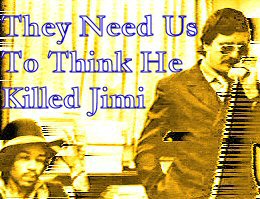 The Martyrdom of Mike Jeffery
How Moguls Seed the Web to Affect Perceptions of Rock Prophecy
by Michael Fairchild
Thirty Nine Years After Jimi's Death
Words Get Put Into His Manager's Mouth by the ROADIE After "THE ROADIE" was Exposed in My Movie...
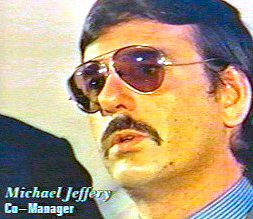
.
In summer 2009 a book was put out by a roadie who worked for Mike Jeffery, Jimi Hendrix's manager. Mike Jeffery financed and arranged Jimi's rise to stardom. Jeffrey had previously produced and managed The Animals, a hit making British band of the 1960s. Jeffery's "roadie" worked on tours with The Animals, he did not roadie for Jimi Hendrix and he is not mentioned in any of the many biographies of Jimi. The book that was ghost-written for the roadie in 2009 scantly mentions Hendrix, mainly 75 words that he claims Mike Jeffery said to him in 1973, a few weeks before Jeffery died in a plane crash:
"I was in London the night of Jimi's death and together with some old friends...we went round to Monika's [Jimi's girlfriend] hotel room, got a handful of pills and stuffed them into his mouth...then poured a few bottles of red wine deep into his windpipe. I had to do it. Jimi was worth much more to me dead than alive. That son of a bitch was going to leave me. If I lost him, I'd lose everything." - Mike Jeffery (allegedly) The roadie claims Mike Jeffery said he'd taken out a life insurance policy on Hendrix worth $2 million (£1.2 million), with Jeffery as beneficiary. Jimi was murdered in September 1970 because, says the roadie, three months later, in December 1970, Mike Jeffery's management contract with Hendrix was due to expire and Jimi planned to hire a different manager. To people familiar with Jimi's story, three red flags jump out from these claims: 1) Mike Jeffery wasn't "in London," he was in Spain when Jimi died in London on September 18, 1970.
"There was a freak storm across Majorca [Spain] and all the phone lines were down. Somebody told Mike that Jimi had been trying to phone him. The first call that got through was to say Jimi was dead. Mike was terribly upset at the thought of Jimi not being able to get through to him." - Trixie Sullivan, secretary/assistant for Mike Jeffery 2) Motive: "in December 1970, Mike Jeffery's management contract with Hendrix was due to expire." Wrong. The Hendrix/Jeffery management contract was not due to expire until 1972, and beyond that Jimi & Jeffery shared ownership interests in a recording studio, as well as film contract commitments well into the '70s. In 1970 imminent contract expiration was no motive for Jeffery to kill Jimi. 3) Motive: "Jeffery had taken out a life insurance policy on Hendrix." Wrong. The only insurance policy on Jimi's life was taken out by his American record company, Warner Bros.
"Jeffery wanted a 'key-man' insurance policy that - should one partner die - made one million dollars available to either partner to buy out the full interest in the company." - Jim Marron, Hendrix/Jeffery business associate
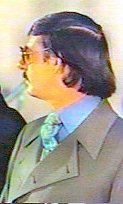
"When we were in Hawaii filming Rainbow Bridge (August 1970, a month prior to Jimi's death), Jeffery was trying to get Jimi to sign a million-dollar insurance policy. I had bad feelings about it and warned Jimi not to sign. I then later confronted Jimi in Oahu, asking if he had signed any agreements, and he said, 'Just some performance contracts that I was behind on.' I was relieved, but I still warned him to look out for it." - Bob Levine - assistant to Mike Jeffery Mike Jeffery was in no position to benefit from Jimi's death. Hendrix left no will, his death meant his father then controlled all "product." John Hillman, a British solicitor who specialized in international tax laws, set up an offshore tax haven company called Yameta in the Bahamas for Mike Jeffery. "Part of Jeffery's trouble," observed Hillman, "was that he was untidy. He did a whole lot of side deals…He did divert funds, there's no question of that, but that doesn't necessarily mean he stole anything." "I wouldn't have worked for Jeffery for all those years if I thought anything like that [stealing from Jimi] was going on." - Trixie Sullivan "Mike would say, 'I'm distributing funds to the boys' or 'They own me money and I'm deducting it and I will pay you Yameta proportion…He was a rogue, but I could forgive him a lot. There are thousands of singers - virtually all of them get nowhere. It's only people like Mike, with all their shortcomings, that bring them into the public eye, take a chance on them, pay their expenses, sweat and steal to get them into the position they finish up in. And that costs money. And the average artist, when he gets there, doesn't really want to know what it has cost. He just wants to say, 'Where's my money?'" - John Hillman "The relationship that Mike Jeffery, as manager to the Hendrix Experience, had with Jimi was very simple; Mike took care of all the business side of things, arranged to get money when we could, did all the money side of it, and left Jimi totally, totally in charge of the artistic side of it." - Trixie Sullivan When The Times of London reviewed the 2009 book by the roadie who accuses Mike Jeffery of killing Jimi, The Times described Jeffery as "a ruthless, moneygrabbing, ex-army businessman who wore shades and took drugs, but never understood what Hendrix's music was about." Two things about this description are at the center of my doubts about Jeffery having killed Jimi.
"TOOK DRUGS" "Trixie had tried to reach Jeffery by field telephone as Mike was meditating on the side of a volcano on the island of Maui. This was the other side of Mike Jeffery the sharp businessman - the side that smoked dope, dropped LSD and gave Abbie Hoffman $10,000." - Harry Shapiro, biographer of Hendrix
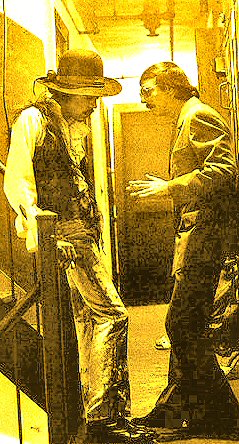 Acid Buddies "Mike Jeffery, who was my associate partner at the time (1966-1968), he started taking a lot of LSD and Jimi and him became like acid buddies, as it were, discussing different concoctions, what to take one day after the other. It was madness in the office. I was aware they were doing drugs, but never realizing how much they were putting down, and it was impossible to talk to these people, somebody was always on a trip. To try to talk to your partner and the artist, you know, you say to the artist one day, for God's sake you've got to stop this, you'll do your brain in, and twenty minutes later your partner comes in and they're discussing what they're going to take that afternoon." - Chas Chandler (co-manager, with Jeffery, of Hendrix, 1966-1968) Taking LSD with another person repeatedly is in no way a casual or superficial choice. Jimi's bass player said Hendrix kept a considerable stash of acid he'd received from Stanley Owsley, the purest and most powerful LSD of the '60s. There are those who know what that LSD experience is like, and those who don't. Those familiar with it realize Hendrix and Jeffery likely got to know each other's personality as much as two people can, and they must have been compatible, otherwise they would not subject themselves to each other's company while "under the influence." This is a common sense assessment, but it's pretty much impossible to convey that reality to the majority of people who're unfamiliar with powerful LSD. If Jeffery were plotting murderous intent on Jimi, the odds would be very "high" that Jimi, in that heightened perceptual state, would pick up on Jeffery's "vibe" - or whatever you want to call sensing the emotions of your friends. The second point from The Times' description of Jeffery is both false and unfair: "NEVER UNDERSTOOD WHAT HENDRIX'S MUSIC WAS ABOUT" When I try to imagine Mike Jeffery killing Jimi, what stops me is understanding that Jeffery, far more than anyone besides Chas Chandler, had the most intense and acute insight into Jimi's music. I became aware of this through a unique experience. For many years I worked with Alan Douglas, Jimi's friend and producer. Alan was with Hendrix the night before Jimi died, and he visited Mike Jeffery a few days later. Alan does not believe Jeffery had anything to do with Jimi's death. But during the seven years I worked with Alan at the official Hendrix production company, we were charged with selecting, packaging, and releasing many of Jimi's recordings, from his highest charting albums to lots of songs previously unknown to Hendrix listeners. From that vantage point of having analyzed pretty much all of Jimi's unreleased recordings comes a perspective on Mike Jeffery that no one but me has yet considered or appreciated. When Hendrix died in September 1970, he left behind hundreds of hours of recordings of dozens of songs yet to be released. Many of those songs had a dozen or more different versions, with even more choices for vocal tracks and guitar solos to select final "released" songs from. It is in those "choices" that the stunning relationship Jeffery had with Jimi's music emerges. JEFFERY'S LEGACY During the two years following Jimi's death, Jeffery assembled four albums from the tons of unreleased music. "Michael Jeffery" is credited as "Executive Producer" on these first posthumous Hendrix records:
Cry Of Love - Feb. 1971 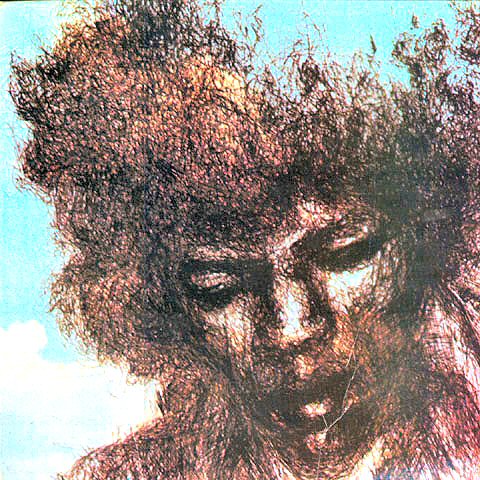 Rainbow Bridge - Oct. 1971 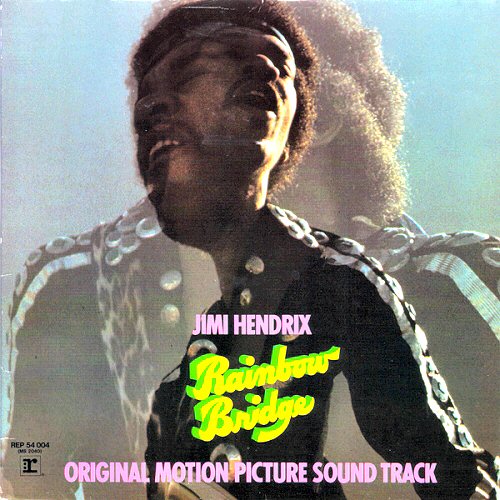 In The West - Feb. 1972 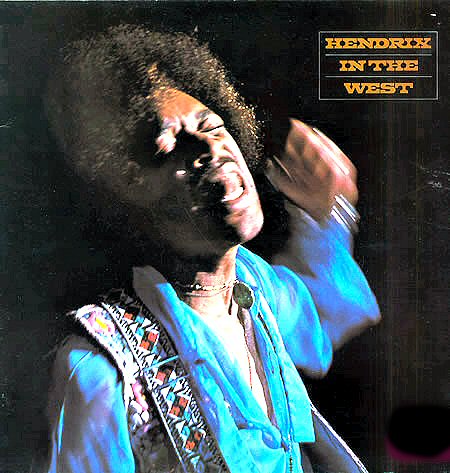 War Heroes - Oct. 1972 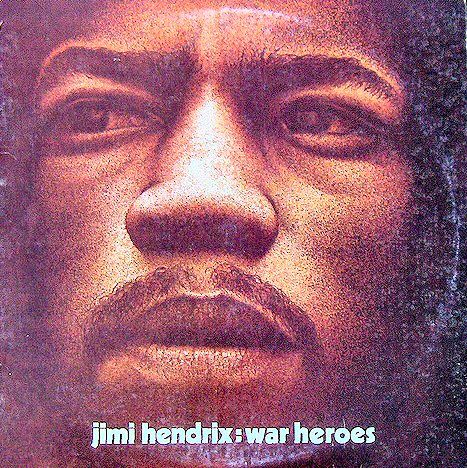 .
As the "Executive Producer" Jeffery had final say about which of Jimi's unreleased songs to include with each album, and in which order they were to be released. In those pre-CD years, vinyl "LPs" (long playing records) held only so many songs per "album side." Jeffery avoided releasing "double albums" to keep the price of the records lower for Jimi's fans (mostly in their teens and twenties). Given these restraints, his choices for the music on those four records reveal a personality that had intense affinity with and sensitivity to Jimi. The person who assembled those records reveled in Hendrix, knew Jimi and loved him.
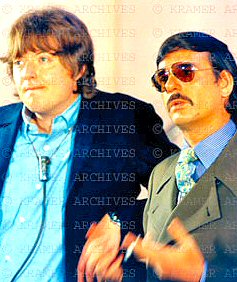 Chandler & Jeffery - co-managers Jeffery hired a series of recording engineers to capture Jimi's sounds in many different studios in Europe and the U.S. For these first four posthumous Hendrix albums shown above, Jeffery hired Ed Kramer to engineer the recordings. In his biography of Hendrix, Kramer takes credit for choosing some of the songs. But that's not the role of a hired recording engineer. Kramer was Jeffery's employee, paid a flat fee, he had no percentage stake in the ongoing sales of these records. Mike Jeffery did have percentage at stake and he had the authority to override Kramer's advice, or anyone else's suggestions. That Kramer would later credit himself (after Jeffery died) for some song selections on those albums benefited his career and reputation as an engineer, and Jeffery is not here to dispute it. But it makes no sense for Jeffery to farm out decisions that were going to have a huge effect on his business of marketing Jimi's unheard songs. I worked on 14 official Hendrix CDs and I know that the song list is the pride and province of the executive producer. I also know that Jimi's long-time British girlfriend told me that Hendrix regarded Kramer as little more than the manager's janitor. She said Jimi called Kramer the chimney sweeper of the studio!
. If you listen to all of Jimi's unreleased music, a feat that takes, under typical conditions, several months to do - comparing so many different versions of songs, multiple vocal takes and dozens of guitar tracks to evaluate, it's clear that there were extremely high chances of using one of the lesser tracks for those first four posthumous albums. This pitfall became painfully obvious after 1996 when the criminals who today control Jimi's releases were put in charge of choosing songs for release, after Paul Allen paid millions to have me removed from the Hendrix company. All of those beautiful album tracks hand-picked by Mike Jeffery are today replaced by the dullard's collection - fantastically bad and inferior versions of Jimi's music seemingly randomly thrown together by leather-eared assassins of the Hendrix legacy. That's all that's available of Jimi's "official" music today. To have the ability to recognize Hendrix at his best is a thankless job of a million curses. An organized ZOO of collectors are ready to condemn whatever selection you make simply because you, and not them, is in the position to make the decision.
"They all hate me, because I have control of the situation, and they want to control it." - Alan Douglas
After working with these people for decades I became suffocated by the awareness that most Hendrix fans can't distinguish between his performances of acutely concentrated inspirations, and his going-through-the motions exercises in exhaustion. The syndrome is painfully on display today at Youtube - to look at all those tracks that collectors post online, people new to Jimi's music have pretty much zero chance of ever finding the magical recordings that originally shattered our senses four decades ago. The music that Jimi himself authorized, followed by Mike Jeffery's truly inspired collections of posthumous Hendrix albums, have been absolutely lost and buried beneath an avalanche of mediocre versions which simply irritate most of the unfortunates who stumble upon them. Hendrix has thus been consigned to the dustbin of history at the hands of Paul Allen, head of the collectors who subconsciously seek to "take Jimi to their graves" and make sure future generations never get the "good stuff." Even these paragraphs of description of the syndrome are off limits as Microsoft spybots troll the web to prevent most browsers from accessing this webpage.
The Martyrdom Of Mike 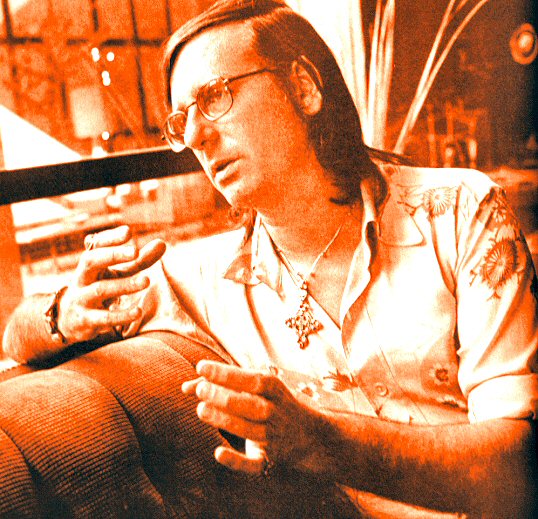 Before being killed in a plane crash in March 1973, Mike Jeffery had assembled one last posthumous Hendrix album, which was released a year later, titled Loose Ends. As with the four prior Mike Jeffery compilations, I am again struck by an amazing sensitivity to prioritizing in his selections - as if he was counting down a list of "most critical songs to release in this order" for Jimi's final legacy. His choices were just so correct, and in the right order of logically diminishing relevance. Album chart positions and number of records sold don't matter in this regard. The point was to recognize the gem tracks amidst tons of lesser attempts. My life's experience has proved to me that very, very few people can do that when it comes to Jimi. Hendrix albums never again cracked the Top-5 on Billboard charts until Alan Douglas produced Crash Landing in 1975, followed by the albums I put together in 1990 (Cornerstones) and 1994 (:Blues). It was through familiarity with all of Jimi's music that I came to reject the notion that Mike Jeffery killed Jimi. Those early posthumous Hendrix albums could only have been assembled by someone extremely close to Jimi. So then, what is the meaning of a roadie, in 2009, many decades after Jimi's death, claiming Mike Jeffery killed Hendrix? His book is called ROCK ROADIE. "ROADIE kills ROCK Star" is the subject, two years earlier, of my movie. My film is the real target of the roadie's book. My movie "plays with the evidence" to suggest new scenarios about how Jimi died, because we don't know which scenario, if any, is true. There is only a (substantial) body of non-conclusive evidence and details. For near four decades there have been about a half dozen different scenarios for Jimi's death that the known evidence suggests might be plausible. But the nature of the evidence is such that I wouldn't even prioritize which of the scenarios are more likely than others. Conclusions are so elusive, in fact, that when considering possibilites impartial people can assemble connections to suggest suicide. Here are the most probable theories listed alphabetically:
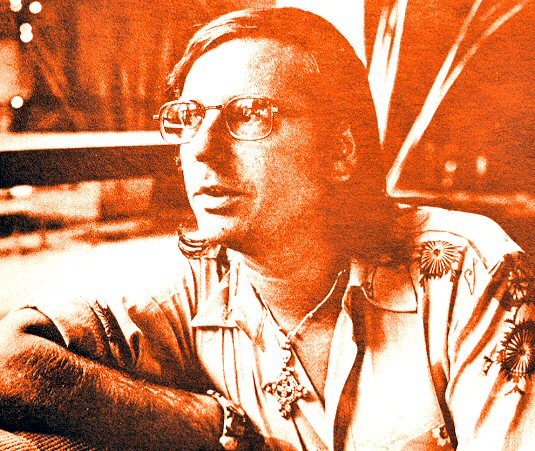 1) Accident - A possibility that Jimi chugged/gulped the wine to wash down Monika's sleeping pills. Not getting to sleep, but groggy, he may have forgotten he already took pills and in a stupor took more off the night stand. He might've dozed off with the bottle positioned to tip off balance at some movement. 2) Anti-counterculture person(s)/group - The summer that Jimi died in 1970, Woodstock was the hit movie, climaxing with his rendition of The Star Spangled Banner. At the same time, Jimi's new album reached the Top-5 on Billboard charts and featured has anti-war anthem Machine Gun. Hendrix was the Golden Calf, Prophet-In-Chief, High Priest centerpiece of an extremely controversial, divisive anti-war hallucinogenic hippie counterculture. They did not label his music "acid rock" for nothing. He was Poster Boy for a vast subculture that millions of straight people hated, detested and were threatened by. 3) Jealous lovers - Jimi's promiscuity is reported to have included spouses of other men, one of whom may have came back at him. 4) Mafia - Hendrix & Jeffery owned a recording studio in an area of New York's Village that was controlled by organized crime. The studio had just opened in August 1970 and was attracting media to the block. 5) Mike Jeffery - The guy in charge of the money is a logical suspect.
"Jeffery's dead, he can't answer so he's an easy target,
which is what I don't like about it." - John Hillman 6) Monika Danneman - Jimi died in her flat with her sleeping pills in his system. Her story of what happened changed several times and witnesses contradict her accounts. She expected Jimi to marry her and had a loud fight with him just hours before he died. It's tempting to suspect her of avenging "Teutonic honor" over an indiscretion from Hendrix by spiking his drink/meal with her sedatives, to keep him there in hopes the situation would change the next day. It's also easy to envision her complicit in bungling some attempted rescue after an accident and covering her tracks. Maybe she caused the accident to happen and hastened Jimi's demise by her reaction. 7) Roadies - Jimi's tensions with his roadies are explained in my movie, as Mitch Mitchell said, "The Star Complex." Monika herself pointed an accusing finger at the roadies' behavior at Jimi's death scene:
It's this last scenario that's my original theory, as my film shows a ROADIE ROCK star murder. "ROCK ROADIE," the book, is a response to my movie. It's a fake platform to elevate the 75 WORDS TRANSMITTED BY H.I.M.M. TO SEED THE WEB, designed to co-opt the effect of my film and discredit its premise (the "ROADIE"), funded and promoted by moguls who hate Rock Prophecy. "ROCK ROADIE" is such a hoax book that it shows us fake, doctored-up pictures of the author supposedly in the 1960s, yet we see a coffee mug with the logo "I Love New York" (the slogan wasn't created until 1977). ROADIE'S REVENGE - A Pawn in the Mogul's Game to Discredit My Movie About Why Jimi Died
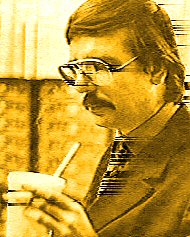 They paid to "seed" the internet with 75 words and have hundreds of websites train readers to blame "the manager" for the death of Hendrix, with no evidence, but loads of motive to divert us from my work which shed new light on how Jimi died. In 1991 and 1992 I wrote the first series of articles that revealed much new details about how Jimi died. That information presented, while I was employed by the official Jimi Hendrix estate production company, instigated a Scotland Yard investigation into the death of Hendrix. It's about MEDIA CENSORSHIP and unjust moneyed moguls who pay to frame Jimi's death in ways that exclude my research and credit others for my work. "The authority [on Jimi's death] is Tony Brown, whose exhaustive book, The Final Days of Jimi Hendrix, came out in 1997. The ambulancemen and police who found Hendrix are interviewed." - The Times, London July 4, 2009 The Times doesn't realize that Tony Brown's been dead since 2001, eight years ago. What they DO realize is that my website proves I am the authority on this issue, and they've determined to cover it up and credit an English collector, Tony Brown, who was a friend of mine. I have dozens of hours of recorded phone calls between Tony and me from the years when we researched Jimi's death. My published reports were the first to present the new information in 1991-92, including the "ambulancemen and police" interviews. These are facts of published history which they deny simply by pretending it doesn't exist - to them, the evidence is only to be suppressed so they can keep concealed Rock Prophecy. When Paul Allen paid millions to prevent me from becoming the next director of the Hendrix estate production company, just about everyone in the Hendrix collectors' network said to themselves, "Michael Fairchild has a billionaire paying big money to destroy his career - I better stay away." Tony Brown was among them. When Tony's book about Jimi's death came out in 1997 I was appalled to see all of my previously published work laid out in it but no mention of my name anywhere in the book. Tony and his publisher were following the lead of Paul Allen's Experience Music Project "Hendrix Museum" in Seattle, which got their central Hendrix collections from my agenting work and nowhere in that trash castle is my name listed among the "thanks" for making their atrocity possible. Because of Mr. Allen's media empire, open season on stealing my work is protected and encouraged - that entire generation of media professionals follow his example to persecute and hurt my work simply out of jealousy that anyone really see Jimi in this way, which is the right way…much more about this later… Hendrix Death According to H.I.M.M. - Fables Construed to Remove My Views
Repeating These Words 1000 Times Online "Seeding The Internet" - the Spin of H.I.M.M. 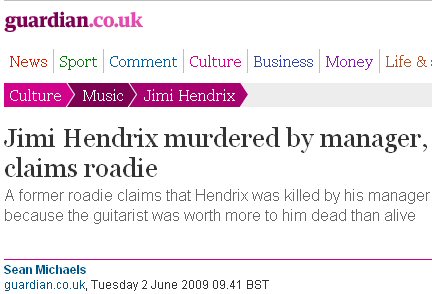 Search Engine "Seeding" - A Rigged Internet of Reports Designed to Divert Us Away from Rock Prophecy's Research On the Death of Hendrix (ignoring reports about why it's important.)
First Century Press has learned that the moguls behind this book roadie hoax are those planning a biopic of Jimi, in which Rock Prophecy is ethnically cleansed out of the picture. Their concern is that my work regarding Jimi's death gets buried beneath an avalanche of bought-off headlines that train consumers to blame the manager and say the case is closed. The 2009 "roadie's book" set the stage for the ending of their film. Hmmm, we'll see, or rather won't see Rock Prophecy in there - ensuring the movie thus becomes junk.
"What Hendrix's death amply demonstrates…is the public's boundless fascination with their too-mortal gods, and the music industry's unerring ability to turn martyrdom into money."
- The Times, London, July 4, 2009 Not quite. Although fixation on "gods" is a subliminal slip for what threatens dominators most about Jimi, because the Hendrix story really does conform to the requirements of "religion," except the "martyrdom" in this case is inflicted on Mike Jeffery, or more specifically, the martyrdom of Rock Prophecy by crucifying Mike Jeffery. Visit These Links for Details About How Jimi Died:
.
Responsible for Scotland Yard Probe of Hendrix Death
|
| © 2009 First Century Press. All Rights Reserved. Contact Us |
